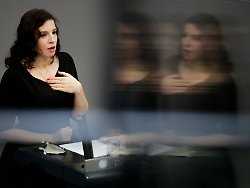Illner-Talk on open letters
“Ukrainians have a right to self-defense”
By Marko Schlichting
May 6, 2022 at 4:58 am
In the past few days, several intellectuals have written two open letters on the Ukraine war. Both want to end the war quickly. However, the ways to get there are different. The guests discuss this on the talk show Maybrit Illner.
Chancellor Olaf Scholz has received mail. In two open letters, scientists, politicians and cultural workers spoke out in favor of an end to the Ukraine war. There are different views on how to achieve this. In the ZDF program Maybrit Illner, two co-signers of the two letters commented on this on Thursday evening – in a very exciting discussion, in which there was almost a consensus in the end
In the first letter, the 28 authors call on Chancellor Olaf Scholz not to deliver heavy weapons to Ukraine. In their view, this step increases the risk of a nuclear attack and a third world war. They advise Ukraine to give up the fight against the Russian invasion.
In contrast, 57 signers of the second open letter advise supporting Ukraine with heavy weapons. This is the only way to counter Russian President Vladimir Putin’s will to annihilate. Some, whose letter was published by the magazine “Emma”, are counting on negotiations and a truce. In the other letter, published on the Change.org platform, the authors initially rely on a military solution. The fact that Ukraine is laying down its arms is out of the question for them. This step could lead to the next war taking place on NATO territory.
Science journalist Rangar Yogeshwar was among the authors of the first letter, and Ukrainian-born publicist Marina Weisband signed the second letter. Both will be guests at Maybrit Illner on Thursday along with other panelists.
“Don’t see letters as opposites”
“Our letter urges that we broaden the debate around the conflict,” publicist Yogeshwar says of the Emma letter. In recent months, people have gotten more and more into military rhetoric, only talking about arms deliveries. The discussion about negotiations had completely receded into the background. There is a latent risk of the war escalating as more and more heavy weapons are supplied to Ukraine, Yogeshwar said. “Experts say that we are now in the most dangerous crisis of a nuclear escalation since the Cuban Missile Crisis,” said the scientist.
He does not like to see the two open letters as opposites. They both had the intention of coming to peace quickly. He and his teammates also want Ukraine to win, but that is unlikely. In recent times no war has ended without an agreement. “That’s why we have to focus on negotiations and not allow ourselves to be distracted by the fact that Russia or Ukraine are causing problems at the moment,” says Yogeshwar.
“Both letters have the same goal, both letters want peace for Ukraine,” Weisband confirms. However, she is convinced: “If we say: We will not supply Ukraine with heavy weapons, it must not have the opportunity to drive the enemy off its territory, then there will be no peace in Ukraine. If it surrenders and some territories to Russia leaves, then these are the areas where people are mistreated, raped and murdered. That is dictatorship. And dictatorship is not peace.”
“Ukrainians will not surrender”
The political scientist and peace researcher Nicole Deitelhoff finds the idea of open letters fundamentally wrong. “It’s an incredibly bad sign for the state of the debate about supporting Ukraine in Germany that we’re now fighting each other with open letters and not with arguments,” she says. The goal cannot be a military victory for Ukraine, the goal must be that Ukraine does not lose the war. Arms deliveries are not a purpose in themselves, but they do serve a purpose, together with economic sanctions, to force the Russian president to the negotiating table, Deitelhoff makes clear.
This is exactly what Weisband wants to achieve. She says: “The Ukrainians have a right to self-defense and they will not surrender.” Anyone who demands concessions from Ukraine must say how many cities it should give up.
Yogeshwar owes the answer. He can understand Marina Weisband’s concerns, but he is also afraid that Germany could be pushed into an escalation of the war. “We have to understand that we are triggering a dynamic that at some point is no longer controllable.” This war has fallen out of time because it is being waged by a system that lives in the 19th or 20th century. “But we’re living in the 21st century, and we need resources for completely different challenges, let’s think about climate change. It’s all the more important that we keep calling for instruments that go away from military escalation,” Yogeshwar demands.
Weisband agrees: “It’s a conflict between the old and the new,” she says. Dictators like Putin feared nothing more than democratic societies, energy independence and a general shift in values and norms. That’s why she says: “Today we have to show that anyone who wages aggressive war in 20th-century style will fall flat on their face so powerfully and so strongly that they will never try it again. And that’s why we have to deliver weapons, weapons, that Putin fears even more than heavy weapons, namely solidarity and hope. And as democratic countries, we have to stand together, do climate protection, invest in education and new energies, because all the dictators’ asses get a lot more grounded from that.”
